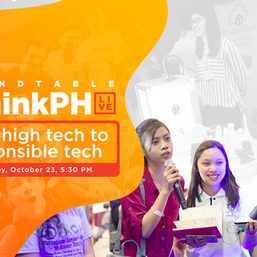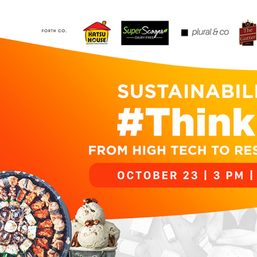SUMMARY
This is AI generated summarization, which may have errors. For context, always refer to the full article.

How many of your friends’ phone numbers do you remember?
It may be a simple thing, but just a decade ago, a good number of people could remember multiple phone numbers. Today, you might be lucky to remember more than 3 commonly used phone numbers.
According to Simon Kemp, the founder of marketing strategy consultancy Kepios as well as a consultant for We Are Social, this is one great example of how technology – led by internet-connected smartphones – has actually changed human physiology
“More than half of the world’s population is now connected to the internet and every single day, a million people start using it for the first time,” Kemp pointed out at Rappler’s 2017 #ThinkPH summit on Saturday, July 15.
What’s more, every day 50,000 new people sign up to Facebook and experience the internet for the first time through it.
“The Internet is helping all of us connect and we’re doing more stuff online now, not just social media. It’s inspiring. But the weird thing is that our internet habits, especially on our smartphones, are actually changing the way our brains work,” Kemp noted.
“This has raised some issues that need to be addressed,” he added.
“For example, how do we ensure truth doesn’t get lost when people outsource their memories. If there is no record of what went before, we’ve lost everything that defines us,” he added.

Marketing to machines
This doesn’t just raise philosophical questions, however. The way technology is shaping humans could also have some very practical considerations.
Nowhere will this be more readily apparent than in the business world where the rise of Artificial Intelligence (AI) and voice control is set to radically redefine how we interact with our devices.
Both emerging technologies are becoming more and more commonplace on smartphones in the form of AI powered assistants like Amazon’s Alexa, Apple’s Siri, and the Google Assistant.
These smart assistants and their platforms have jumped beyond the confines of smartphones to standalone connected devices, such as Amazon’s Echo or Google Home, which are meant to act as de facto control centers for connected homes.
This type of smart AI-powered voice control, Kemp noted, is set to redefine how we fundamentally interact with our phones.
“We are addicted to staring at our phones but suddenly with voice control we don’t need to look at the screen anymore. The real reason [big tech firms] are hyping this and making it difficult for users to use the old system is that this allows them to completely rethink the user interface,” he explained.
“Eventually,” Kemp added, “voice control and the AI that powers it may lead us to outsource not only our memories but also our decisions to the Internet.”
For instance, one’s shopping decisions, such as buying the daily groceries, do not hinge on any particular product.
Amazon’s Echo, which is connected to the firm’s giant retail network, is already beginning to offer a form of automated shopping where all a user has to do is tell the device to add beer or laundry detergent to the shopping list.
The brand chosen will then use an algorithm that determine which brand would particularly suit the user.
This, in turn, will change how marketing works: an individual user’s preference eventually takes a back seat to algorithms in the name of simplicity and convenience.
“As a marketer you would no longer trying to persuade the individual to buy these brands, you are instead trying to persuade the algorithm to choose these brands on behalf of people,” Kemp said.
“An entire industry suddenly changes, I’m not marketing to consumers, I’m marketing to machines that are basically running the lives on behalf of the consumer. Technology is going to change how our brains make decisions. It’s not just that our brains are going to forget how to make memories but (also) decisions, because devices are making decisions for us” he added.

The internet of agreements
If that sounds a little unsettling to some, people can rest assured as another emerging technology on the horizon could also bring people closer to each other.
That technology is blockchain, a technology we are already somewhat familiar with as it is what underpins the bitcoin cryptocurrency. Anyone who has ever used google docs online also knows blockchain as the technology that allows users to see who has made changes to a document and when they enacted those changes.
The important thing about blockchain, Kemp noted, is that it is open source – anyone can use it and people do not need to really understand it to enjoy its potential.
Celebrated software engineer and futurist Vinay Gupta defined it as such: “If the world wide web is the Internet of ideas, blockchain is the internet of agreements.”
“The essential thing about blockchain is it enables trust-less transactions. It completely adds confidence to everything we do. As long as you have blockchain I don’t have to trust you,” Kemp said.
A proper implementation of blockchains would allow for an explosion of digital payments on a micro-scale that could eventually disrupt the two dominant business models on the internet, advertisements and user data.
Being able to pay content creators in small amounts would eliminate the need for a website to be funded by advertisements, for example.
The technology could even facilitate a new concept of smart contracts.
“You would have no need for lots of wordy, complicated legal stuff in contracts anymore. You basically have a blockchain that tells people what’s going to happen, and it happens whether or not either party wants it to happen once it’s agreed to in the first place,” Kemp explained.
He continued; “We cannot cheat the blockchain in the way that we’re used to. All of a sudden fraud becomes very difficult, which for the most of us law-abiding citizens, is a very good thing. It will eliminate a lot of the bad things on the internet.”
But it is what blockchain could do for data – even personal data – that may be even more revolutionary.
“Business on the Internet today is all about identity, but that will change once users can own their own data. Blockchains will allow you to create an account with your data and then you can choose to sell it , or even which parts of it to sell. So now we will decide who knows what,” Kemp explained.
On a larger scale, blockchain technologies could also perform the same role as goverment identification or passports. The technology could, if allowed to flourish, make the concept of sovereignty and nations even more fluid.
The technology, after all, has already affected the global financial system through bitcoin, which is a lot more independent than traditional currencies are because government’s have less control over them.
Having and owning your own personal data using blockchain could facilitate the same thing with citizenship.
“Given this, there’s no reason for you to associate who you are with a given country. For a lot of us where come from is a source of pride but sometimes you’d want to change,” Kemp said.
Besides an emotional connection, he explained, currency and passports are the main things that make you a citizen of a country.
“So if governments have less control, who do we become? Suddenly, citizenship becomes a lot like employment and could change quickly depending on where the opportunities are. What’s interesting about the opportunity here is that we have a lot more control of who we are and where we want to go,” Kemp noted.
Whether it will have that big of an effect remains to be seen. The crucial thing is that our decisions, unlike our future grocery shopping, will be made by us and not by the algorithms. – Rappler.com
Add a comment
How does this make you feel?





There are no comments yet. Add your comment to start the conversation.